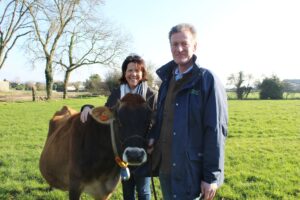
How Jersey can make use of Bio-Char Pyrolysis – by Roderick McCafferty, a Scottish inventor with family links to both Jersey and Guernsey
We are all Islanders – we all live on Earth, which is an island in space. Every resource we share is on this island.
My first visit to Jersey was in September of 1974 with my wife, Anne, when we came here on our honeymoon. Fast forward to 2004 and my daughter, Angela, discovered the beauty of the Channel Islands and became a permanent resident, firstly in Guernsey and now in Jersey. My other daughter, Theresa, has been a Guernsey resident these past nine years.
Visiting them and meeting Islanders as friends rather than coming here as tourists, I have discovered the independent nature of the Channel Islanders. An island can have special challenges and resources are not always available as easily as on the large island of Britain.
Last year I spent some time between Jersey and Guernsey and the particularly hot weather (remember I’m from Scotland) didn’t do the farmers any favours with dust clouds following tractors as they did their vital work. Crops were in danger of being lost. Farming is vital and nothing useful can be sustained without food. I wondered if there was an answer. A local answer would be best for an island.
My attention was drawn to a possible solution as I read an article in the JEP and later in copies of RURAL magazine, which my daughter, Angela, gave me. The first one concerned sea grass degradation by anchor chains rubbing on the seabed as the tides flowed and ebbed. A bit of research established that sea grass can recover in two to three weeks in warm seas and can be harvested and used as a soil binder and fertiliser! There was one possible answer to the dusty soil. The sea grass could not only enrich the soil, but could bind it and save it from blowing away as well! Brilliant!
It occurred to me that although sea grass was endangered a few years ago, it was now back and improving the coastal waters by reducing carbon acidity. If this local resource was properly managed it could provide a renewable source of fertiliser for Jersey. Any excess crop would be certainly a transportable and saleable product for the Island and could earn revenue. It was a win/win scenario!
I am a member of an inventor’s network in Scotland and collectively we look at all sorts of problems and try to find answers. It’s almost a compulsion. One of our members was looking at carbon sequestration, as this is one of the buzzword topics these days. He was hoping to use the end product called bio-char as a fertiliser for soil enrichment in Asia and Africa. I have attended a few of the Malawi Millennium Partnership meetings in Edinburgh. Soil degradation merits an urgent need for bio-char. Perhaps a lack of crop rotation has exacerbated the poor soil condition. I don’t know if fertiliser is actually available. Still applications of bio-char could be the answer. So what exactly is bio-char and how can it be harvested or manufactured? Well, basically bio-char is carbon and it can be made from any burnt wood! That’s pretty handy! It can be made in a very pure form as charcoal which has been made for centuries as a major constituent of black powder for guns.
The process involves cooking a material like willow in an enclosed oven where there is little oxidising air, so the wood cannot actually be consumed. The process is called pyrolysis and a good link if anyone is interested is hello@onnu.com The pyrolysis process can also be applied to plastic waste like nylon ropes and plastic bottles retrieved from recycling, or indeed from waste washed into the sea! Many islands around the world are retrieving such plastic waste and processing it into a bio-fuel to operate outboards on small dinghy’s and rotavators for planting crops on small areas of land. Many self-sufficient communities have found this plastic pollution sea waste to be a life saver!
Having seen the independent nature of Jersey and Guernsey Islanders and their care for their island home, it occurred to me that catch points for spent barbeque coals could also be a great source of bio-char. It would make a good school project to involve the young Islanders. It’s not all doom and gloom as seems to be the popular accepted idea today. Not everything needs to be ‘banned’ as a default solution. Equally beach cleaning of plastics need not be a problem for land fill when it would be easy to utilise a pyrolysis converter to make your own fuel or fertiliser! Other materials like car tyres and other carbon waste can provide bio-char fertiliser for Island farms, or actually earn revenue from sales overseas of a locally produced product. That means that these money earning, useful materials need not go to landfill, nor require costly journeys for disposal in overseas incinerators.
Yes, we are all islanders and our resources and options can seem limited, but with self determination and application of hard work and intelligent thinking we need never feel marooned. Where there is a problem there is an answer. It’s the island way. I’m looking forward to my next visit to the Channel Isles!
Mr McCafferty can be contacted as follows:
Roddy McCafferty, 10, Kirkhill, Kilwinning, KA13 6NB Scotland
Tel: 01294554247 Mobile: 07708837961
E-mail: roderick77772005@yahoo.co.uk
See also: https://youtu.be/TFuTCpCVSbM




